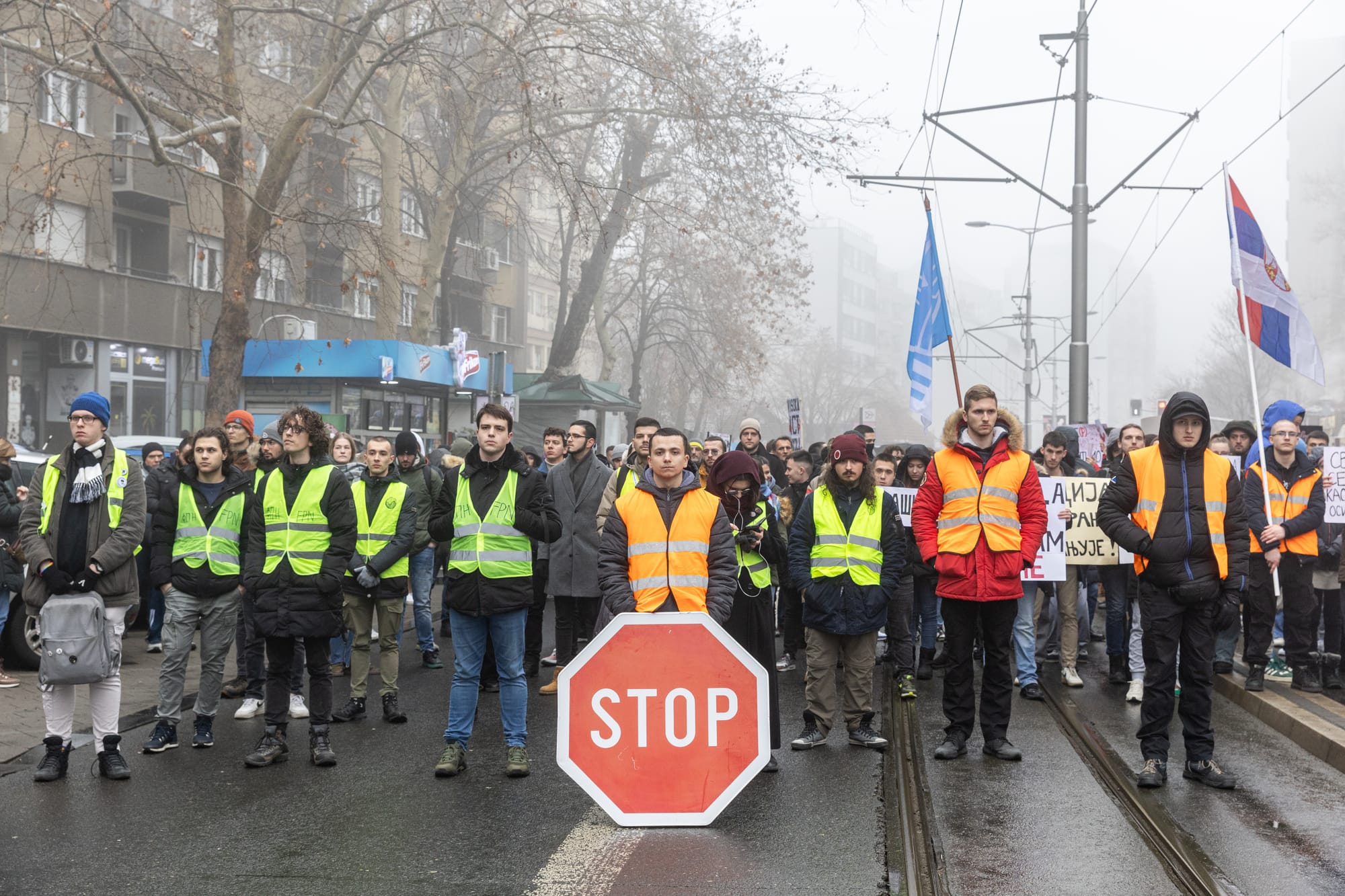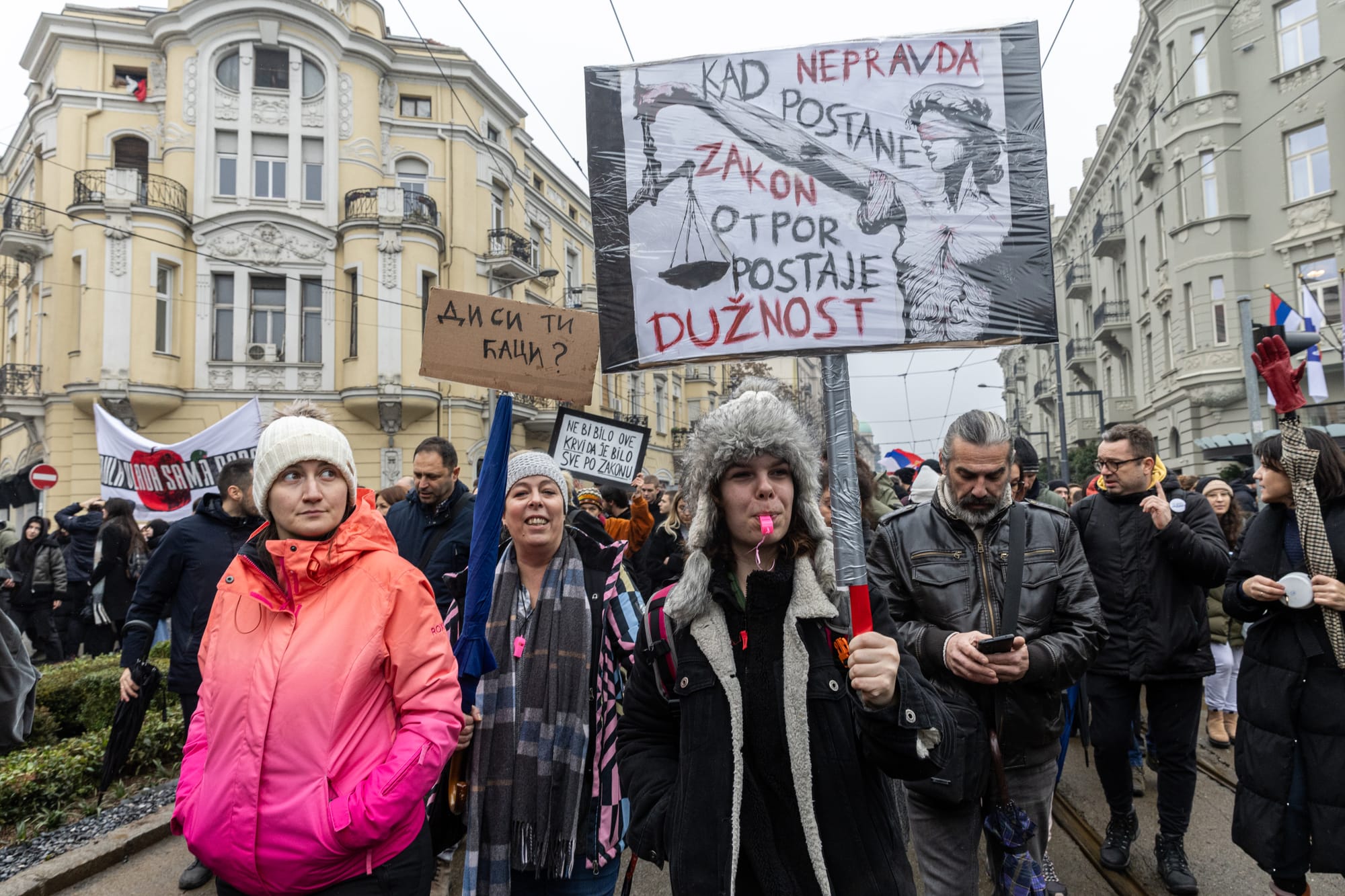Serbians turn sadness into anti-government rage

On Monday evening, Iva Bakračlić sat among tens of thousands of protestors blockading an intersection leading into Belgrade, Serbia’s capital.
Months of student-led anti-government protests against the ruling Serbian Progressive Party (SNS) came to a head as the populist Prime Minister Milos Vucevic announced his resignation on 27 January.
Many like Bakračlić have been sleeping on the streets, their tents decorated with anti-regime slogans as people play chess, basketball or card games to pass the time. On Friday, a call for a general strike saw widespread support from lawyers, teachers, farmers, small business owners and others across the country.
‘We are here so our media can’t ignore us,’ says Bakračlić. Much of Serbia’s media and other key institutions are controlled by the government, in what some analysts say amounts to state capture. Opposition parties and rights watchdogs have accused the ruling party of bribing voters, stifling media freedom, enacting violence against opponents, corruption and ties with organized crime.
The anti-government movement emerged after a deadly disaster at a train station on 1 November in the city of Novi Sad, which killed 15 people and injured two. Many blamed the deaths on corruption and a lack of oversight of construction projects. Public outrage over the tragedy soon prompted regular nationwide protests. Scores of protesters have been arrested since November and some injured by assailants associated with the ruling government. Prime Minister Aleksandar Vučić and Vucevic have dismissed the protestors as being controlled by ‘Western foreign agents’.
‘When nobody took the blame for Novi Sad, sadness turned to rage,’ says Bakračlić.
The Serbian government denied allegations of corruption, but several officials and executives including the former minister of infrastructure were indicted in December. Novi Sad Mayor Milan Djuric also stepped down on Tuesday.

Meanwhile, Serbs remain deeply frustrated with the ruling elite. Uroš Pantović, a 22 year old student in Belgrade, echoes the views of many people who say politicians ‘have corrupted the country … only to line their own pockets.’
The movement is demanding the government publish all documentation on the Novi Sad disaster, drop charges against those arrested during the protests and end impunity. Vucevic's resignation is the government’s latest move to cede to these demands — but not everyone is convinced.
‘It is useless’, says Bakračlić. ‘We want institutions to do their job properly and fairly, and having the president take justice into his own hands is only keeping us away from this goal. He wants students to think he's doing us a favour, when what's really necessary is a functioning system, where these things would be handled by institutions, according to law.’
Serbia’s parliament must confirm Vucevic's resignation, after which they will have 30 days to choose a new government or call snap elections.
Another blockade is planned for Saturday 1 February in Novi Sad.
— Ingrid Gercama (@Ingrid_Gercama)
📰 Read more about the Serbian government's crackdown on protesters in our Nov/Dec issue (page 61 — exclusive access for Currents subscribers)
👉 Follow Bojana Novakovic for updates in English and Serbian on the anti-government protests
✊ Get involved in the peaceful demonstrations in solidarity with the students of Novi Sad on 1 February in Amsterdam, Vienna, Milan, Salzburg, Zurich and Stockholm. More info here.
Like what you've read? Support us with a tip.
Are you a freelancer? Pitch us a story.
Looking for more? Listen to our podcast The World Unspun
Shop ethical goods at our very own Ethical Shop
Subscribe to New Internationalist magazine and get Currents absolutely free!

